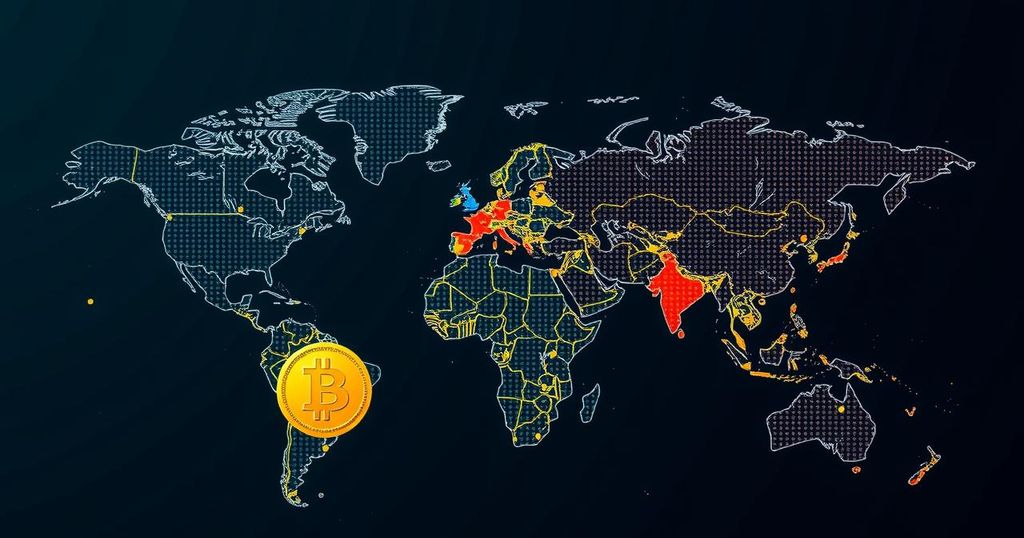BRICS Nations Turn to Bitcoin Mining to Strengthen Economies and Reduce Dollar Dependence

Argentina, the UAE, and Ethiopia have joined BRICS and are utilizing government resources for Bitcoin mining as a response to economic challenges and to reduce reliance on the U.S. dollar. Russia is also investing in Bitcoin mining through its sovereign wealth fund, reflecting a trend among various nations seeking alternatives to traditional financial systems amidst geopolitical and economic pressures.
The recent integration of Argentina, the United Arab Emirates (UAE), and Ethiopia into the BRICS coalition has highlighted their commitment to Bitcoin mining, utilizing domestic governmental resources to bolster economic resilience. This coincides with an increased emphasis from Russia, where the sovereign wealth fund is making significant investments in Bitcoin mining operations. Bitcoin mining is an intricate process, requiring sophisticated computer systems to solve complex cryptographic puzzles, which facilitates the addition of new Bitcoins to the network. Miners are compensated with Bitcoin for their contributions; however, this endeavor demands substantial electrical power and advanced computational capabilities, making it a costly venture. Nonetheless, the pursuit of Bitcoin mining offers these nations a pathway to generate supplementary income and diversify away from reliance on the U.S. dollar. As observed by the investment firm VanEck, Argentina, the UAE, and Ethiopia are engaging with Bitcoin mining as a response to their existing economic turbulence and instability within their financial systems. These countries aspire to enhance their financial autonomy by exploring alternative monetary options. Furthermore, the move by Russia’s sovereign wealth fund into Bitcoin mining underscores a strategic effort to mitigate the impact of U.S. sanctions while fostering economic growth. This increasing interest in Bitcoin and similar cryptocurrencies exemplifies a broader trend among various nations seeking alternatives to the U.S. dollar, as many of them perceive the American fiscal policies and national debt levels as unsustainable. The allure of Bitcoin as a means to conduct financial transactions outside the conventional banking system is becoming increasingly appealing for several nations grappling with economic challenges. Understanding these dynamics reveals the evolving landscape of global economics, particularly in the face of geopolitical shifts and financial instability. Disclaimer: The information provided by Altcoin Buzz is intended solely for educational and informational purposes and should not be construed as financial advice. The perspectives mentioned reflect the opinions of the authors, which may diverge from personal investment strategies.
The article discusses the increasing involvement of countries such as Argentina, the UAE, and Ethiopia in Bitcoin mining as a strategy to enhance economic stability and reduce dependence on the U.S. dollar. This interest comes in light of economic pressures and the perception of an unstable financial system exacerbated by high levels of U.S. debt and spending. The context is further enriched by Russia’s significant engagement in Bitcoin mining through its sovereign wealth fund, signaling a broader trend among nations seeking to diversify their financial resources amid geopolitical uncertainties.
In summary, the adoption of Bitcoin mining by Argentina, the UAE, and Ethiopia, alongside Russia’s substantial investment, marks a significant shift in the financial strategies of these nations. Their efforts aim to confront economic hardships and diminish reliance on the U.S. dollar, reflecting a growing trend among countries seeking financial independence through alternative currencies. As the global economic landscape evolves, the role of Bitcoin and cryptocurrencies will likely continue to expand, driven by the desire for greater financial autonomy and stability.
Original Source: www.altcoinbuzz.io








